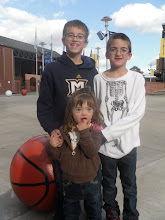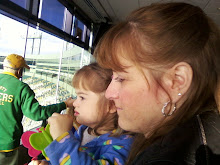I have been posting off and on about Jonathan Mooney’s book “The Short Bus.” I probably have two postings (this and another one) left in me. It really was a very interesting book.
There are certain symbols that exist in our society that have certain connotations. Almost everyone recognizes these things, like the short school bus and the features of Down syndrome. They convey certain emotions. Jokes are even made about these things, like both the short bus and r-word jokes. This brings pain to some, including me. Mooney decided to drive around the US in a short bus hearing individuals’ stories because it was such a symbol. It was an important part of the experience – encountering the difficulties of the short bus again. He was yelled at during the journey – people yelled out the “r-word” because of how slow he could drive in it. He witnessed fear during the journey – a young man with Down syndrome saw Mooney’s short bus and was fearful that Mooney was going to take him away in it. While on the journey, he thought of all the ways he would destroy or abandon the short bus on the end of the journey – demonstrating his power over this representation of all the difficulties he faced during his placement in special education. All the pain, all the jokes, all the hurt. All the social stigma. But in the end, Mooney decides he can’t destroy or abandon the short bus. It started to represent all the beautiful people he met and the great experiences he had on this journey. It no longer represented pain and hurt; it represented love and acceptance amongst this group of people he met and for himself. It became a part of him.
Isn’t this what Down syndrome can be like too? At first, it is so difficult to recognize the eyebrows that touch in the middle, the crease across the hand, the flat feet, etc. You want to do away with it, and have just your child there. You experience things like hurtful words from others and feelings of fear. You hope people don’t recognize the Down syndrome, kind of like you hope no one sees you exiting the short bus. Comments like, "she doesn’t look like she has Down syndrome," can actually make you happy. You want the Down syndrome, but not your child, to go away like Mooney’s short bus. Somewhere on this journey things change. You begin to see the true beauty of it all. You look and look at that beautiful face and see the beauty in the eyebrows. And then you meet truly beautiful people you would never have known before. These are the best people you ever met in your life – they are caring, loving, accepting, and they don’t take things for granted like others you know. Then you learn so much about yourself. You are becoming more sensitive to differences, you are thinking of things in a whole different way, and you love more than you ever imagined you would love. You come to cherish what you were given. Like Mooney’s short bus, you begin to see that this is something that you can’t do without.
-Karyn
What day is it, even?
5 years ago


















Very moving post Karyn. I'm to weepy to say more.
ReplyDelete---Jen
I stumbled upon your site. Your daughter is beautiful and as a mother of a daughter with DS, I appeciate your post. I have not read the book, but I have heard of it.
ReplyDelete